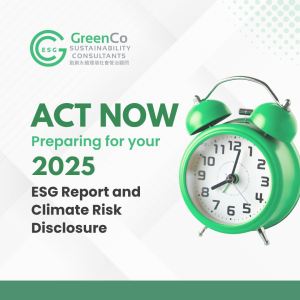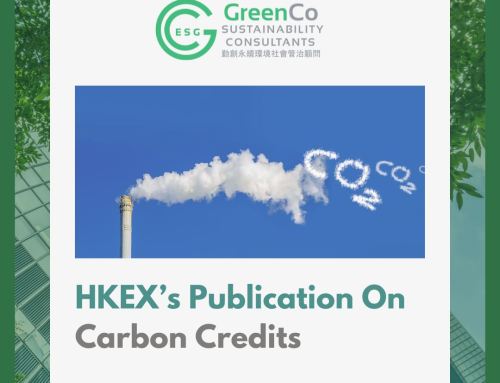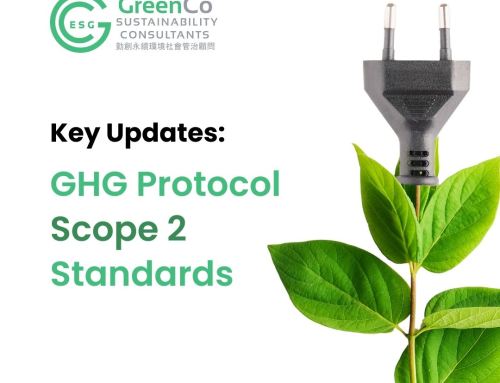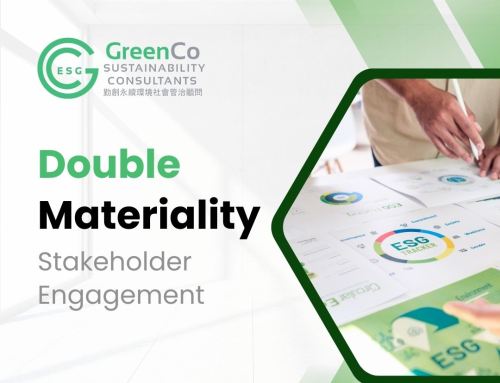Act Now for ESG Report and Climate Risk Disclosure
The clock is ticking for listed companies in Hong Kong. Starting from financial years commencing on or after 1 January 2025, the Hong Kong Stock Exchange (HKEX) will require enhanced ESG disclosures, particularly on climate-related risks and opportunities. These requirements, set out in the new ESG Code, align with IFRS S2 – Climate-related Disclosures, marking a significant step toward global consistency in sustainability reporting.
Why Prepare Early?
The upcoming disclosure rules introduce Part D: New Climate Requirements, which are far more complex than the previous ESG Guide. Companies will need to:
- Measure and disclose Scope 1 & Scope 2 GHG emissions starting FY2025, with Scope 3 emissions (value chain-related) expected.
- Conduct climate scenario analysis to assess resilience under different climate pathways.
- Disclose financial impacts of climate risks and opportunities on revenue, costs, and investment plans.
- Integrate climate risk governance into business and financial planning.
While HKEX has offered certain implementation reliefs (e.g., reasonable information, capabilities, or commercial sensitivity reliefs), the burden of proof remains high. Companies choosing “explain” under the “comply or explain” regime are expected to provide a clear work plan and timeline for future compliance.
The Cost of Delay
Climate and ESG disclosures are no longer a “nice-to-have”—they are becoming as critical as financial reporting. Without early preparation, companies risk:
- Data collection bottlenecks, especially for Scope 3 emissions across supply chains.
- Limited capacity to conduct robust scenario analysis or financial modelling.
- Reputational risk if disclosures are incomplete or perceived as superficial.
Starting preparation now means allocating sufficient resources, training internal teams, and engaging external advisors where necessary.
How GreenCo Can Help
Since 2016, GreenCo has been dedicated exclusively to ESG reporting, stakeholder engagement, and climate risk advisory. With deep experience in aligning local ESG practices to international frameworks, we are well positioned to help listed companies:
- Bridge the gap between current reporting and the new HKEX requirements.
- Establish clear disclosure frameworks and climate governance structures.
- Assist building robust Scope 3 emissions inventories across the value chain.
- Conduct scenario analysis and evaluate financial impacts in line with IFRS S2.
Call to Action
The first 2025 ESG reports will cover this reporting year, meaning companies should already be preparing. Whether it’s data gathering, setting up governance systems, or drafting climate disclosures, early action is key to ensuring quality, compliance, and credibility.
👉 Don’t wait until the deadline is looming. Reach out to GreenCo today and start building your ESG and climate resilience journey.
Further Reading:
The Hong Kong Stock Exchange published the Consultation Conclusion and Implementation Guidelines. GreenCo is eager to assist companies and their management in alleviating stress by providing a concise overview of the forthcoming regulatory enhancements.
About GreenCo ESG Consulting
GreenCo is a professional ESG advisory firm accredited with ISO 9001 in the Provision of ESG / Sustainability Reporting, Sustainanbility and Climate Disclosures and GHG Accounting Advisory Services. Established in 2016, we were born to tackle ESG and climate risk management challenges. GreenCo has a professional team consists of talents with multiple backgrounds with
- PhD
- Practitioner Member of the Institute of Sustainability and Environmental Professionals (ISEP)
- CFA (the CFA Institute) and Certificate in ESG Investing
- EFFAS Certified ESG Analyst (CESGA)
- GRI Certified Sustainability Professional
- Certified Public Accountant (for assurance in accordance with ISAE 3000)
- Member of Global Association of Risk Professionals
- Master’s degree in envirnomental science
GreenCo has solid track record in ESG advisory for over 70 listed companies in Hong Kong, Mainland China, Singapore and Korea, covering all industries under the Hang Seng Industry Classification System.








